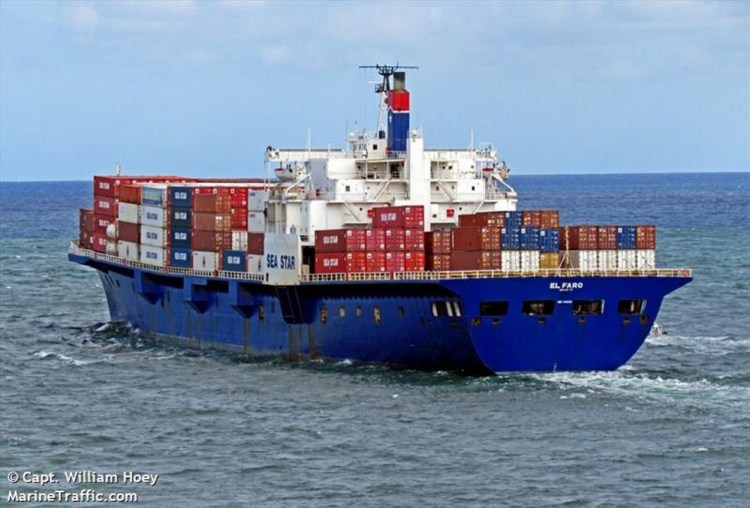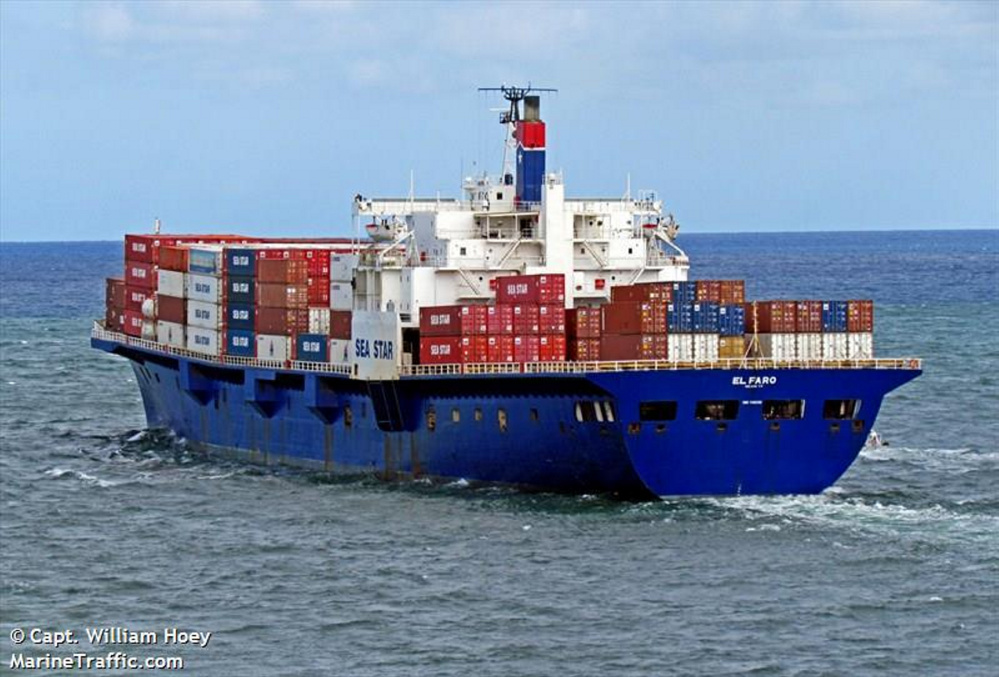The Navy was zeroing in Sunday on what it believed to be the wreckage of the El Faro, two days after the company that owns the lost cargo ship took steps to limit its legal liability in the deaths of the 33 people on board, including four Mainers.
A Navy search team sent a remotely operated vehicle 3 miles down to the ocean floor off the Bahamas on Sunday to examine the wreckage, located by sonar Saturday near the El Faro’s last known position. As of 11:30 p.m. Sunday, it had not yet confirmed whether the ship had been identified.
On Friday, El Faro owner TOTE Services Inc. filed a motion for exoneration from or limitation of liability in U.S. District Court in Jacksonville, Florida, saying the company exercised due diligence to make the ship “seaworthy in all respects and properly manned, equipped and supplied.”
The company’s motion to limit to $13.2 million the amount it can be compelled to pay families of the 33 victims, based on the weight of the ship and its cargo, is a procedural step that is based in existing U.S. maritime law.
A maximum liability of $13.2 million would equal a cap of about $400,000 per victim, although a judgment against TOTE for that amount would not likely end in an even split among victims’ families, legal experts said.
The court filing came just hours before the Navy search team found the wreckage about 1:30 p.m. Saturday, 30 days after the ship sank. The team used special sonar equipment towed behind the Navy ship, the Apache.
The Navy was scheduled to send its CURV-21 remotely operated vehicle at noon Sunday to survey the ship, which sonar scans indicated was in one piece and upright on the ocean floor. The wreckage of what is believed to be the 790-foot cargo ship was found near Crooked Island, its last known position.
The National Transportation Safety Board said the trip down would take about three hours, and that once there, the vehicle would try to find information to confirm the wreckage is that of the El Faro.
NTSB spokesman Peter Knudson said the vehicle also would inspect and document the condition of the ship and any debris field. He said the main focus would be retrieval of the voyage data recorder, the ship’s version of an airplane’s “black box.”
Knudson said that if the vehicle were to encounter any human remains, the team would try to retrieve them by any means possible.
“The ship will certainly not be recovered; the ship is going to stay there. The containers are too deep to do any kind of recovery mission,” Knudson told The Associated Press. “If human remains are encountered, an attempt would be made to recover them.”
He said depending on the weather, the recovery mission could take two weeks or less.
The ship, captained by Michael Davidson, 53, of Windham, left Jacksonville for San Juan, Puerto Rico, on Sept. 29 on its regular weekly run as Tropical Storm Joaquin was turning into a powerful hurricane near the Bahamas. As it neared the storm, the El Faro reported it had lost propulsion and was listing. Investigators say Davidson told the vessel’s owners that he planned to pass 65 miles south of the center of Hurricane Joaquin, but that the ship was just 20 miles from the powerful storm’s eye 18 hours later when the Coast Guard received its final distress call.
Davidson reported that there was a hull breach, a scuttle had blown open, and there was water in one of the holds, the NTSB said. He also said the ship had lost its main propulsion unit, and that the engineers could not get it going.
Also on board were Danielle Randolph, 34, of Rockland, Michael Holland, 23, of Wilton, and Dylan Meklin, 23 of Rockland. All four Mainers were graduates of Maine Maritime Academy in Castine. Crew member Mitchell Kuflik of Brooklyn, New York, was also an academy graduate.
Deb Roberts of Jay, the mother of Holland, told WCSH-TV, Channel 6, that the discovery of the wreckage reopened emotional wounds.
“It just brings it all back again. It makes it more real. It is a good thing,” Roberts said.
The Press Herald was unable to reach any of the victims’ family members by phone Sunday. Maine Maritime Academy spokeswoman Jennifer DeJoy said via email that academy officials were withholding any comment on the circumstances surrounding the El Faro’s sinking and the NTSB investigation.
In its court filing Friday, TOTE asked the court to limit the company’s maximum liability in crew member death claims to $15.3 million – $2.1 million for the value of the freight plus $13.2 million for death claims based on a calculation of $420 per gross registered ton – and prohibit any prosecution or other legal proceedings against it. The move to limit liability was an expected one, said Portland maritime attorney Timothy Steigelman.
The Limitation of Liability Act of 1851 says that the owner of an ocean-going vessel can limit its liability for crew member deaths to the value of the vessel and its freight, as long as the owner can show it lacked prior knowledge of the problems that caused the deaths.
Steigelman, an associate at Kelly, Remmel & Zimmerman, said being granted a limitation of liability also stops all other lawsuits against the ship owner and forces all of the parties seeking liability claims to come together and negotiate individual settlements out of a pool of money determined by the court.
“A limitation action is kind of like a mini-bankruptcy just for that one ship,” he said.
Incidents involving multiple deaths at sea often lead to a combining of cases followed by negotiations over how much money will be distributed to each plaintiff, Steigelman said. The money could be divided in part based on the number of surviving spouses and children, for example.
Still, he said that if the court finds a ship owner did have prior knowledge of problems that led to deaths or injuries, it would not grant a liability limitation.
A law firm representing four El Faro crew members whose families have filed claims against TOTE said Thursday that it intends to seek justice for the families, and that it is accusing the ship owner of negligence.
Arnold & Itkin LLP of Houston said in a statement that it believes TOTE officials knew the El Faro “was an aged and ailing vessel with structural problems and with a history of taking on water.” It added that the defendants “knew, allowed, and encouraged the El Faro to leave port knowing the potential dangers that lay ahead of the hurricane.”
TOTE officials declined Sunday to comment on the legal actions. Spokesman Michael Hanson said the company’s focus remains on support and care for the families and their loved ones.
“We confirm that families have been contacted regarding compensation. We do understand that in these difficult and tragic circumstances, a number of families may have pressing financial burdens and we want to ensure that we are there to help immediately,” he said.
Hanson said the details of the discussions are confidential.
“Our efforts remain focused on providing care and support and this step is a step for those who may choose it,” he said.
Send questions/comments to the editors.






Comments are no longer available on this story